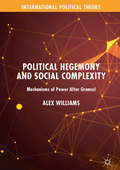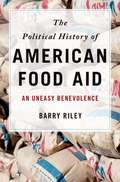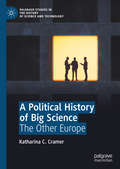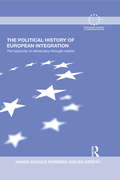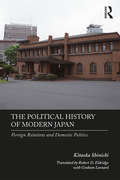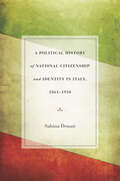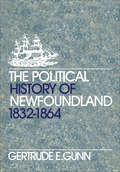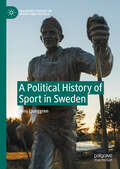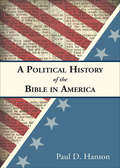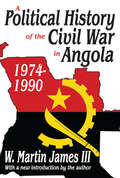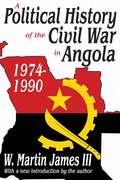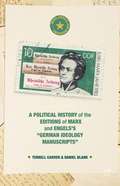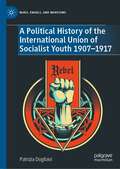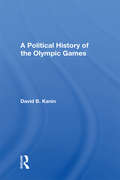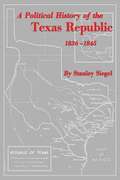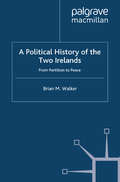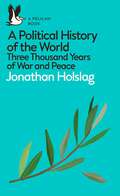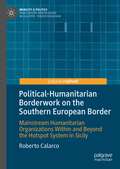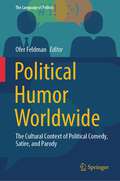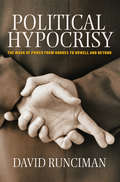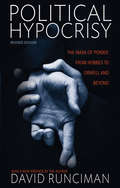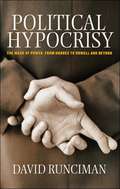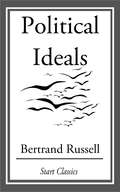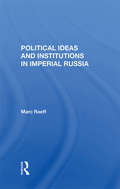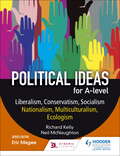- Table View
- List View
Political Hegemony and Social Complexity: Mechanisms of Power After Gramsci (International Political Theory)
by Alex WilliamsHow can we understand power in a world of ever-growing complexity? This book proposes that we can do so by rethinking the theory and practice of political hegemony through the resources of complexity theory. Taking Gramsci’s understanding of hegemony as its starting point, the book argues that the intricacies of contemporary power can be mapped by applying concepts drawn from complexity theory, such as emergence, self-organisation, metastability, and generative entrenchment. It develops an original account of social complexity, drawing upon critical realist sociology, analytic philosophy of science, Marxist and continental philosophies, and neoliberal and anarchist thought. It then draws out the elements of Gramscian hegemony that already align with complexity concepts, such as the balance of forces, common sense, and the historic bloc. On this basis, the book sets out the different dimensions of complex hegemonic power before using this theory to interpret the nature of the power of neoliberalism since 2008.
The Political History of American Food Aid: An Uneasy Benevolence
by Barry RileyAmerican food aid to foreigners long has been the most visible-and most popular-means of providing humanitarian aid to millions of hungry people confronted by war, terrorism and natural cataclysms and the resulting threat-often the reality-of famine and death. The book investigates the little-known, not-well-understood and often highly-contentious political processes which have converted American agricultural production into tools of U.S. government policy. <P><P>In The Political History of American Food Aid, Barry Riley explores the influences of humanitarian, domestic agricultural policy, foreign policy, and national security goals that have created the uneasy relationship between benevolent instincts and the realpolitik of national interests. He traces how food aid has been used from the earliest days of the republic in widely differing circumstances: as a response to hunger, a weapon to confront the expansion of bolshevism after World War I and communism after World War II, a method for balancing disputes between Israel and Egypt, a channel for disposing of food surpluses, a signal of support to friendly governments, and a means for securing the votes of farming constituents or the political support of agriculture sector lobbyists, commodity traders, transporters and shippers. <P><P>Riley's broad sweep provides a profound understanding of the complex factors influencing American food aid policy and a foundation for examining its historical relationship with relief, economic development, food security and its possible future in a world confronting the effects of global climate change.
A Political History of Big Science: The Other Europe (Palgrave Studies in the History of Science and Technology)
by Katharina C. CramerThis book investigates the political history of Big Science in Europe in the late twentieth century and the early twenty-first century, characterised by the founding histories of two collaborative, single-sited facilities namely the European Synchrotron Radiation Facility (ESRF) in Grenoble, France and the European X-Ray Free-Electron Laser (European XFEL) in Schenefeld, Germany. Under the heading of the other Europe, this book presents the history and politics of European Big Science as an alternative road to (Western) European integration besides the mainstream political integration process of the European Economic Community and the European Union. It shows that Big Science has a role to play in European politics and policymaking and that the crucial and unavoidable symbiosis between science, technology and politics brings the creation of Big Science projects back to geopolitical realities.
The Political History of European Integration: The Hypocrisy of Democracy-Through-Market (Routledge Advances in European Politics)
by Bo Stråth Hagen Schulz-ForbergFirst published in 2010. Routledge is an imprint of Taylor & Francis, an informa company.
The Political History of Modern Japan: Foreign Relations and Domestic Politics
by Kitaoka ShinichiSpanning the 130-year period between the end of the Tokugawa Era and the end of the Cold War, this book introduces students to the formation, collapse, and rebirth of the modern Japanese state. It demonstrates how, faced with foreign threats, Japan developed a new governing structure to deal with these challenges and in turn gradually shaped its international environment. Had Japan been a self-sufficient power, like the United States, it is unlikely that external relations would have exercised such great control over the nation. And, if it were a smaller country, it may have been completely pressured from the outside and could not have influenced the global stage on its own. For better or worse therefore, this book argues, Japan was neither too large nor too small. Covering the major events, actors, and institutions of Japan’s modern history, the key themes discussed include: Building the Meiji state and Constitution. The establishment of Parliament. The First Sino-Japanese and Russo-Japanese Wars. Party Politics and International Cooperation. The Pacific War. Development of LDP politics. Changes in the international order and the end of the Cold War. This book, written by one of Japan's leading experts on Japan's political history, will be an essential resource for students of Japanese modern history and politics.
A Political History of National Citizenship and Identity in Italy, 1861-1950
by Sabina DonatiThe fascinating origins and complex evolution of Italian national citizenship come alive in the pages of this rich history. Covering the period from the unification of Italy in 1861 through the early years following the Second World War, Sabina Donati explores the civic history of female and male Italians in the peninsula, Italy's immigrants and emigrants, and the country's colonial and overseas native populations. Donati makes extensive use of archival research and delves into the policies, debates, and formal notions of Italian national citizenship. Her narrative aims to grasp the multi-faceted, evolving, and often contested vision(s) of italianità that have developed in historical perspective and are discussed here in relation to alienhood, racial thinking, migration, expansionism, and gender. As a pioneering modem history of Italian citizenship, this work highlights often-overlooked precedents, continuities, and discontinuities within and between liberal and fascist Ital(ies). Ultimately, it seeks to contribute to citizenship and identity studies by comparing Italy with other European countries, fully bringing out the specificity of the Italian case in relation to French, British, and German citizenship traditions. Book jacket.
The Political History of Newfoundland, 1832-1864
by Gertrude E. GunnThree decades of disorder followed the establishment of representative government in Newfoundland in 1832. The pressures and processes during these years have given Newfoundland a political history peculiarly its own. This study examines the structure of the early political parties, the causes of popular tumult, and the effects of constitutional change during this colourful and complex period. First published in 1966, this book is still the most comprehensive investigation of a crucial phase in Newfoundland's political development.
A Political History of Sport in Sweden (Palgrave Studies in Sport and Politics)
by Jens LjunggrenThis book presents a history of Swedish sport, highlighting in particular the relationship between sport politics and people’s changing attitudes towards sport from the eighteenth century until today. It scrutinizes the interaction between sport politics and people’s different approaches to sport in everyday life. By investigating how different ways of pursuing and conceptualizing sport have progressed and interacted, and how they have influenced as well been influenced by sport politics, this book discerns the role of both governmental and municipal politics in the development of sport in Sweden.
A Political History of the Bible in America
by Paul D. Hanson"Biblical history, enriched by many religious and cultural traditions, flows into and is intertwined with our nation's epic, both for better and for worse. To ignore that history is to cut ourselves off from our roots and to deny the ancestral experiences that forged our individual and collective identity. " --from the prologue This substantial work explores the interplay of religion and politics throughout the history of the United States. Paul D. Hanson traces American history back to colonial times, paying close attention to the role that biblical tradition has played in shaping the national story of the United States. He then presents a detailed study of politics in the Bible that is framed by the challenges and crises in American history. Students will learn how deeply religion has influenced both domestic and international policy and contributed to the nation's sense of identity and purpose. After laying these biblical-historical foundations, Hanson considers a method of biblical interpretation that can speak to the diverse nation of today. He proposes an inclusive form of public moral discourse that invites full participation by members of all religious and philosophical groups.
A Political History of the Civil War in Angola, 1974-1990 (The\east-south Relations Ser.)
by W. Martin James IIIWhen Portugal's colonial rule in Angola ended in 1974, three liberation groups-UNITA (National Union for the Total Independence of Angola), FNLA (National Front for the Liberation of Angola), and MPLA (Popular Movement for the Liberation of Angola)-agreed to a tripartite movement for the fledgling nation. Conflicts quickly arose and the MPLA, with Cuban and Soviet assistance, drove its rivals from the capital, instigating a civil war, which continues into three periods (1975-1991, 1992-94, and 1998-2002). This volume covers the first period, focusing on the political history of the UNITA movement and its struggles with the MPLA. The Angolan civil war was the product of personal jealousies, contrasting ideologies, and ethnic animosities. From its inception, the conflict between UNITA and Angola's Marxist government was an international affair involving the U. S., the USSR, China, and many African states: W. Martin James III, who wrote his book near the close of the first period of civil war, contends that despite Gorbachev's "new thinking" and talk of peaceful solutions to regional conflicts, Soviet policy toward Angola marked a reversion to the Brezhnev Doctrine. The biggest MPLA-Cuban offenses occurred during Gorbachev's tenure with Soviet advisers at the brigade level directing an MPLA offensive. American policy toward Angola is also examined here. This is the first book to emphasize the dynamic role of UNITA in the Angolan liberation movement. James acknowledges that the importance of foreign powers in guaranteeing a government of national reconciliation. Just as important are strategies of compromise requiring trust in a political context where it is violated and submission for the common good where defiance is a remnant of the colonial past. Foreign policy analysts, African area specialists, and scholars of post-colonial history find this volume indispensible.
A Political History Of The Civil War In Angola, 1974-1990 (The East-south Relations Ser.)
by W. JamesWhen Portugal’s colonial rule in Angola ended in 1974, three liberation groups—UNITA (National Union for the Total Independence of Angola), FNLA (National Front for the Liberation of Angola), and MPLA (Popular Movement for the Liberation of Angola)—agreed to a tripartite movement for the fledgling nation. Conflicts quickly arose and the MPLA, with Cuban and Soviet assistance, drove its rivals from the capital, instigating a civil war, which continues into three periods (1975-1991, 1992-94, and 1998-2002). This volume covers the first period, focusing on the political history of the UNITA movement and its struggles with the MPLA. <p><p> The Angolan civil war was the product of personal jealousies, contrasting ideologies, and ethnic animosities. From its inception, the conflict between UNITA and Angola’s Marxist government was an international affair involving the U. S., the USSR, China, and many African states: W. Martin James III, who wrote his book near the close of the first period of civil war, contends that despite Gorbachev’s "new thinking" and talk of peaceful solutions to regional conflicts, Soviet policy toward Angola marked a reversion to the Brezhnev Doctrine. The biggest MPLA-Cuban offenses occurred during Gorbachev’s tenure with Soviet advisers at the brigade level directing an MPLA offensive. <p> American policy toward Angola is also examined here. This is the first book to emphasize the dynamic role of UNITA in the Angolan liberation movement. James acknowledges that the importance of foreign powers in guaranteeing a government of national reconciliation. Just as important are strategies of compromise requiring trust in a political context where it is violated and submission for the common good where defiance is a remnant of the colonial past. Foreign policy analysts, African area specialists, and scholars of post-colonial history find this volume indispensible.
A Political History Of The Editions Of Marx And Engels’s "german Ideology Manuscripts"
by Terrell Carver Daniel BlankSince the 1920s, scholars have promoted a set of manuscripts, long abandoned by Marx and Engels, to canonical status in book form as The German Ideology, and in particular its 'first chapter,' known as 'I. Feuerbach. ' Part one of this revolutionary study relates in detail the political history through which these manuscripts were editorially fabricated into editions and translations, so that they could represent an important exposition of Marx's 'theory of history. ' Part two presents a wholly-original view of the so-called 'Feuerbach' manuscripts in a page-by-page English-language rendition of these discontinuous fragments. By including the hitherto devalued corrections that each author made in draft, the new text invites the reader into a unique laboratory for their collaborative work. An 'Analytical Introduction' shows how Marx's and Engels's thinking developed in duologue as they altered individual words and phrases on these 'left-over' polemical pages.
A Political History of the International Union of Socialist Youth 1907–1917 (Marx, Engels, and Marxisms)
by Patrizia DoglianiThis book represents a valuable contribution to the history of the Socialist Second International and, more generally, of European socialism between the Great Depression of the 1880s and WWI. It comes to fill a gap in the scholarship, insofar as it investigates the history of the Socialist Youth International. During the first phase of the making of socialist parties, this organization was in charge of the political and cultural education of the proletarian youth. Capitalizing on an approach based on social, quantitative and political history, and on an analysis of mentalities and languages, the book reconstructs the many-sidedness of the “school of recruits” of the social-democratic and revolutionary movements. The working conditions of youth in Europe, its unionization and economic struggles, the fight against militarism, the pedagogical work, the internationalism and the commitment to maintain peace, and the attitude of young militants towards Bolshevik revolution are some of the themes investigated in the book. It also clarifies the role and the engagement with the issue of the new generation shown by prominent figures of Marxism such as Karl Liebknecht, Jean Jaurès, Henri De Man, Willi Münzenberg, Henriette Roland Holst, and Robert Danneberg. Finally, the book constitutes also a page of European social and political history, reconstructed through the history of the various youth socialisms and their relationship with the Marxist tradition.
A Political History Of The Olympic Games
by David B KaninThe turmoil surrounding the 1980 Olympic Games, says the author, was nothing new--it was merely the most recent, and most complex, manifestation of the political content of modern sport. Despite the mythology perpetrated by Olympic publicists, the modern Olympic Games were founded with expressly political goals in mind and continue to thrive on tie
A Political History of the Texas Republic, 1836-1845
by Stanley SiegelThis book is unique among the histories of the Texas Republic: it is the first to examine the fledgling nation from the point of view of its dynamic political life. Policies with far-reaching results were formulated in the nine years of Texas' independence, and the author clearly presents the many thorny issues that were to plague Texas for generations. <P><P> The political history of the Republic is one of strong figures vying with each other for popular support of their divergent policies. The author details the personal feuds and animosities that resulted and shows the effects of these differences on the governing of the nation. Thoughtful use of diaries, memoirs, and other contemporary sources gives the reader an excellent understanding of the sense of personal concern the citizens of the Republic felt toward the political issues of the day.
A political History of the Two Irelands: From Partition to Peace
by Brian M. WalkerThis ground-breaking political history of the two Irish States provides unique new insights into the 'Troubles' and the peace process. It examines the impact of the fraught dynamics between the competing identities of the Nationalist-Catholic-Irish Community on the one hand and the Unionist-Protestant-British community on the other.
A Political History of the World: Three Thousand Years of War and Peace (Pelican Books)
by Jonathan HolslagA three-thousand year history of the world that examines the causes of war and the search for peaceIn three thousand years of history, China has spent at least eleven centuries at war. The Roman Empire was in conflict during at least 50 per cent of its lifetime. Since 1776, the United States has spent over one hundred years at war. The dream of peace has been universal in the history of humanity. So why have we so rarely been able to achieve it? In A Political History of the World, Jonathan Holslag has produced a sweeping history of the world, from the Iron Age to the present, that investigates the causes of conflict between empires, nations and peoples and the attempts at diplomacy and cosmopolitanism. A birds-eye view of three thousand years of history, the book illuminates the forces shaping world politics from Ancient Egypt to the Han Dynasty, the Pax Romana to the rise of Islam, the Peace of Westphalia to the creation of the United Nations.This truly global approach enables Holslag to search for patterns across different eras and regions, and explore larger questions about war, diplomacy, and power. Has trade fostered peace? What are the limits of diplomacy? How does environmental change affect stability? Is war a universal sin of power? At a time when the threat of nuclear war looms again, this is a much-needed history intended for students of international politics, and anyone looking for a background on current events.
Political-Humanitarian Borderwork on the Southern European Border: Mainstream Humanitarian Organizations Within and Beyond the Hotspot System in Sicily (Mobility & Politics)
by Roberto CalarcoThis book focuses on the role mainstream humanitarian organizations have in the functioning of the border management system on the southern European border (i.e. Italy). In particular, the author analyses the mainstream humanitarian organizations and NGOs (i.e. Red Cross, the UNHCR, Medici per I Diritti Umani – MEDU, Terre des Hommes and Oxfam) and their role within and beyond the implementation of the so-called ‘hotspot approach’ in Sicily. This work suggests that a vision of humanitarian action as just anti-political and complicit with migration control can be questioned. This book suggests that a) mainstream organizations have been able to politicize their positioning and actions vis-à-vis authorities when migration policies have been tightened; b) mainstream organizations’ political borderwork has helped to promote incremental change in the status quo rather than a radical one. Finally, this book suggests that the discourses and practices of mainstream and grassroots actors seems to be characterized by similar contradictions.
Political Humor Worldwide: The Cultural Context of Political Comedy, Satire, and Parody (The Language of Politics)
by Ofer FeldmanThis collection of original chapters reflects the increasing interest over the past few decades in the relationship between political humor (as a distinct form of political discourse) and a country’s culture: Beliefs, values, norms, institutions, and processes that are affected, shaped by, and related to historical experiences, socialization processes, social structure, religion, the economic system, and majority/minority relations. Written by contributors from various fields of study – political science, communication, linguistics, sociology, culture studies, and political psychology – the book looks at the central role played by “culture” in shaping and affecting the sundry aspects of political humor, including satire and parody. The chapters, focusing on diverse countries such as the USA, UK, Greece, Philippines, Israel, Poland, Italy, and Spain, as well as ethnic groups, offer a comprehensive overview of political humor as used by public figures, including politicians, artists, performers, as well as comedians, talk shows hosts and the general public. By presenting fresh perspectives on the relationship between culture and political humor as employed during political debates in parliament, in media interviews and shows, on the internet and in art, the book opens up new avenues for discussion regarding the factors that shape political humor across the globe in a variety of political and media systems.
Political Hypocrisy
by David RuncimanWhat kind of hypocrite should voters choose as their next leader? The question seems utterly cynical. But, as David Runciman suggests, it is actually much more cynical to pretend that politics can ever be completely sincere. The most dangerous form of political hypocrisy is to claim to have a politics without hypocrisy. Political Hypocrisy is a timely, and timeless, book on the problems of sincerity and truth in politics, and how we can deal with them without slipping into hypocrisy ourselves. Runciman tackles the problems through lessons drawn from some of the great truth-tellers in modern political thought--Hobbes, Mandeville, Jefferson, Bentham, Sidgwick, and Orwell--and applies his ideas to different kinds of hypocritical politicians from Oliver Cromwell to Hillary Clinton. Runciman argues that we should accept hypocrisy as a fact of politics, but without resigning ourselves to it, let alone cynically embracing it. We should stop trying to eliminate every form of hypocrisy, and we should stop vainly searching for ideally authentic politicians. Instead, we should try to distinguish between harmless and harmful hypocrisies and should worry only about its most damaging varieties. Written in a lively style, this book will change how we look at political hypocrisy and how we answer some basic questions about politics: What are the limits of truthfulness in politics? And when, where, and how should we expect our politicians to be honest with us, and about what?
Political Hypocrisy: The Mask of Power, from Hobbes to Orwell and Beyond, Revised Edition - Second Edition
by David RuncimanWhat kind of hypocrite should voters choose as their next leader? The question seems utterly cynical. But, as David Runciman suggests, it is actually much more cynical to pretend that politics can ever be completely sincere. Political Hypocrisy is a timely, and timeless, book on the problems of sincerity and truth in politics, and how we can deal with them without slipping into hypocrisy ourselves. Runciman draws on the work of some of the great truth-tellers in modern political thought--Hobbes, Mandeville, Jefferson, Bentham, Sidgwick, and Orwell--and applies his ideas to different kinds of hypocritical politicians from Oliver Cromwell to Hillary Clinton. He argues that we should accept hypocrisy as a fact of politics--the most dangerous form of political hypocrisy is to claim to have a politics without hypocrisy. Featuring a new foreword that takes the story up to Donald Trump, this book examines why, instead of vainly searching for authentic politicians, we should try to distinguish between harmless and harmful hypocrisies and worry only about the most damaging varieties.
Political Hypocrisy: The Mask of Power, from Hobbes to Orwell and Beyond
by David RuncimanWhat kind of hypocrite should voters choose as their next leader? The question seems utterly cynical. But, as David Runciman suggests, it is actually much more cynical to pretend that politics can ever be completely sincere. The most dangerous form of political hypocrisy is to claim to have a politics without hypocrisy. Political Hypocrisy is a timely, and timeless, book on the problems of sincerity and truth in politics, and how we can deal with them without slipping into hypocrisy ourselves. Runciman tackles the problems through lessons drawn from some of the great truth-tellers in modern political thought--Hobbes, Mandeville, Jefferson, Bentham, Sidgwick, and Orwell--and applies his ideas to different kinds of hypocritical politicians from Oliver Cromwell to Hillary Clinton. Runciman argues that we should accept hypocrisy as a fact of politics, but without resigning ourselves to it, let alone cynically embracing it. We should stop trying to eliminate every form of hypocrisy, and we should stop vainly searching for ideally authentic politicians. Instead, we should try to distinguish between harmless and harmful hypocrisies and should worry only about its most damaging varieties. Written in a lively style, this book will change how we look at political hypocrisy and how we answer some basic questions about politics: What are the limits of truthfulness in politics? And when, where, and how should we expect our politicians to be honest with us, and about what?
Political Ideals
by Bertrand RussellMr. Russell has expressed these ideas in his other books. But here they are organized into what is virtually a primer of revolutionary idealism, written with a passionate soberness that stirs the mind as deeply as it moves the heart.
Political Ideas And Institutions In Imperial Russia
by Marc RaeffMarc Raeff is one of the truly outstanding scholars of Russian history. This volume offers a sampling of the best essays from his prolific, forty-year career; they span the history of Russia from the late seventeenth to the late nineteenth century. In these essays, Raeff considers the problems of imperial Russian politics and administration, analyzes Russia's intellectual and social history as it relates to the governance of the multiethnic empire, and places the institutional and intellectual history of Russia in the context of other Western and Central European developments. Raeff's essays offer a sketch of the generation that came of age in the era of the Napoleonic Wars and the ensuing attempts at constitutional reform—the generation that laid the foundations of the modern Russian national consciousness. He explores modernization reform and liberalism in the second half of the nineteenth century, the acquisition and incorporation of Russia's multiethnic population, and the politics and administration of the reigns of Peter III and Catherine II. He examines how the Russian élites assimilated values from the Western and Central European Enlightenment and assesses the important intellectual and ideological effects the Enlightenment had on the nation. The volume concludes with a comparative look at the process of Westernization, focusing on issues of literacy, state leadership, and the role of the intelligentsia. Many of these seminal essays are long out of print and hard to find. This timely volume makes Marc Raeff's insights readily available as Russia reemerges as a nation-state facing "new" challenges that are often deeply rooted in its past.
Political ideas for A Level: Liberalism, Conservatism, Socialism, Nationalism, Multiculturalism, Ecologism
by Neil Mcnaughton Richard KellyExam Board: AQA, Edexcel, OCR & WJECLevel: A-levelSubject: PoliticsFirst Teaching: September 2017First Exam: June 2018Build your students' knowledge of the ideas, tensions and key thinkers within the core ideologies of conservatism, liberalism and socialism, plus the additional ideologies of Nationalism, Multiculturalism and Ecologism.Students will understand the core ideas and principles behind the political ideologies, and how they apply in practice to human nature, the state, society and the economy.- Comprehensive coverage of the ideologies of Liberalism, Conservatism, Socialism, Nationalism, Multiculturalism and Ecologism- Definitions of key terms and concepts to help clarify knowledge and understanding of political language- Exam focus sections at the end of each chapter to test and develop understanding of key topics, offering practice for short and essay questions
